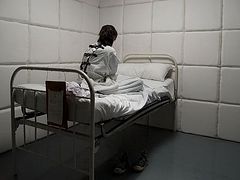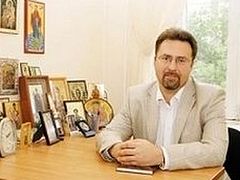One of the consequences of the fall of man is his infirmity and vulnerability before endless physical problems and ailments affecting not only his physical but mental health. Mental illness is the most devastating cross of all! But in the eyes of our Creator and heavenly Father, a mentally disturbed person is just as special, or—due to his severe suffering—even more dear than the rest of us. We will talk about these people, the resources available to them at Church, as well as mental and spiritual health with Dr. Vasily Glebovich Kaleda M.D. Clinical Psychiatry, Professor of the Department of Practical Theology of the Saint Tikhon’s Orthodox University of Humanities.
—You grew up in a devout Orthodox family; your grandfather was glorified among the host of holy hieromartyrs and confessors of Russia, your father and brothers became priests and your sister became an abbess, while your mother also took the monastic tonsure in her old age. How did it happen that you went to study medicine and later chose to specialize in psychiatry? What determined your choice?
—That’s true, I grew up in a family with deeply held Orthodox and church convictions. By the way, my grandfather, Hieromartyr Vladimir Ambartsumov, executed at the Butovo shooting range, was born in Saratov; our family’s history is intimately and spiritually linked with your city, and it’s great pleasure to answer the questions submitted by the journal of the Saratov Metropolia.
Before my father became a priest, he spent many years working as a geologist; my mother dreamed of being a doctor but became a biologist; two of my brothers, the priests, were geologists by their first university degrees, while my sisters received a medical education. We had other doctors in our family among earlier generations as well. It is possible that it also has to do with my first name: We had four ancestors named Vasily in the Kaleda family line, and all of them were doctors. So, it is safe to say that when I chose to study medicine, I carried on a family tradition.
As for choosing psychiatry, it had to do with the effect my father had on me. He held the medical profession in high regard and distinguished psychiatry among the rest of the medical sciences. He felt that the competencies of a psychiatrist somehow border on the competency of a priest. He used to tell me how important it was to have more practicing Christians among psychiatrists, because then if anyone came upon the need to see a psychiatrist, they would have an opportunity to see an Orthodox doctor.
Dmitry Yevgenievich Melekhov, one of the patriarchs of Russian psychiatry, was a friend of my grandfather, Holy Hieromartyr Vladimir Ambartsumov. Soon after his death (he died in 1979), his work “Psychiatry and Problems of Spiritual Life” was published in “samizdat”,1 and my father wrote the foreword for that edition. Later on, the book was allowed to be published legally. Dmitry Evgenievich used to visit us at our house and his visits were always events of immense importance for me, a teenager at the time. When I studied at the medical institute, I finally realized that psychiatry was my true calling. In the years ahead, I never regretted the decision.
—What does mental health mean? Can you safely say that one particular person, despite having certain problems, is mentally healthy, while another one isn’t?
—The problem of sanity is extremely relevant in psychiatry and it is anything but simple. On the one hand, every man is individual in nature, with his specific unique and idiosyncratic qualities. Everyone has the right to his or her mindset. We are inherently different. But, on the other hand, we are all alike. Essentially, life presents us the same set of problems. Mental health is a combination of affirmations, characteristics, and functional capabilities that allow an individual to adapt to the surrounding environment. A man can cope with the circumstances of life all the while keeping his emotional response and appropriate behavior in balance. A mentally healthy person can and must be adept at handling all of his life’s challenges. By all means, the challenges can differ greatly. Some are seemingly unbearable for man to handle. But let’s remember our new martyrs and confessors who saw it all—the methods of interrogation used at the time, prison, and starvation at camps—yet they remained spiritually and mentally healthy people. Let’s also remember Viktor Frankl, a prominent psychiatrist and psychotherapist of the twentieth century, the founder of logotherapy stemming from psychotherapy and specifically based on a search for the meaning of life. Frankl laid the foundation of this new branch of science while still a prisoner at the Nazi concentration camps. Such is the ability of a healthy individual to handle all trials and tribulations, or, in other words, the temptations sent down to him by God.
“Borderline personality disorders and neuroses are much less common among people who lead a high-quality spiritual life than among non-believers.”
 —What we can glean from your answer is that in essence, faith is both the most important condition and, so to speak, an inextinguishable source of spiritual health. Thanks be to God, anyone among us the faithful can attest to this based on our personal experiences. We would have treated our difficulties, sorrows, problems, and losses in a completely different way had we not had faith. Our faith lifts our ability to overcome sufferings to a completely different level unattainable for non-believers.
—What we can glean from your answer is that in essence, faith is both the most important condition and, so to speak, an inextinguishable source of spiritual health. Thanks be to God, anyone among us the faithful can attest to this based on our personal experiences. We would have treated our difficulties, sorrows, problems, and losses in a completely different way had we not had faith. Our faith lifts our ability to overcome sufferings to a completely different level unattainable for non-believers.
—I can only agree with you! The ability of a man to overcome difficulties depends on his mindset and worldview. Let’s think again of Victor Frankl’s story: he was talking about faith, its most powerful protective ability; and that in this context, no other belief system can compare with it. A believer is substantially more stable than someone without faith. This is precisely because he perceives difficulties as heaven-sent. A believer seeks and finds meaning in any misfortune that comes his way. In Rus’ it was historically common to talk about misfortune by saying, “the Lord has paid us a visit.” This is because sorrow makes men think about their spiritual life.
If we are talking about mental illness, as opposed to sanity, we have to understand that anyone can develop a devastating genetic mental illness regardless of his belief system. Another thing is when borderline mental disorders happen among men with specific character traits and, again, a particular worldview. This is exactly when the worldview of a patient is of paramount importance. If he was brought up in a religious family, and with his mother’s milk drank in the conviction that life has an ultimate purpose and suffering also has meaning as the cross sent down by the Savior, then he will accept everything that happens to him based on this specific point of view. If he doesn’t view life from this point of view, then he will accept every trial and every difficulty in life as complete collapse. Here is where I can say with confidence that borderline personality disorders and neuroses are much less common among people who lead a high-quality spiritual life than among non-believers.
—You teach a pastoral psychiatry course. What is it about? Why is it necessary for future pastors to study it?
—Pastoral psychiatry is a section of pastoral theology that has to do with the particular aspects of spiritual care for those suffering from mental disorders. It requires coordination of efforts and the co-counseling of a pastor and a psychiatrist. In this case, a priest should be able to understand the boundaries of mental health, as we have just discussed, or the ability to timely recognize psychopathology and make an adequate decision. Mental disorders, both severe and borderline, are rather common. According to medical statistics, fifteen percent of the population suffers from one or another ailment of this type, and it is only a matter of its degree of severity. Mentally imbalanced people tend to appeal to the Church and seek help from priests. That’s why we can observe such people with these kinds of problems relatively more often at church than generally among the populace. And it’s perfectly fine! It only serves as proof of the fact that the Church is a hospital both for the soul and the spirit. Any priest has had the experience of conversing with people who exhibited symptoms of one or another disorder; I will repeat myself and say that the degree of its manifestation differs greatly. It so happens that it is the priest, not the therapist, who is often able to recognize those cases when someone should be sent for evaluation to the psychiatrist’s office. I came upon some American statistics one day: Forty percent of those who see psychiatrists were there as a result of the advice received from clergymen of various confessions.
It is worth noting that Archimandrite Cyprian (Kern), Professor of Patristics at the St. Sergius Theological Institute in Paris, was the one who introduced the idea to develop the pastoral psychiatry course currently used in many theological learning institutions. In his book on pastoral theology, he dedicated a separate chapter specifically addressing this matter. He wrote about specific problems that cannot be described using the criteria of moral theology since they have nothing in common with the meaning of sin. These problems are manifestations of psychopathology. As for the first specialized manual on pastoral psychiatry, its author was Dmitry Yevgenievich Melekhov, son of the priest and political prisoner we mentioned earlier. It becomes absolutely clear these days that a study course on psychiatry should become a part of the academic standard (if we don’t shy away from using this term) in pastoral education.
—Of course, it is more about a theological than a medical issue, but still, what do you think: Is there any connection between mental disorder and sin? Why are the basic kinds of delusion in a way essentially the “masks” of major sinful passions? For example, take megalomania and its shadow, or the “downside”, a persecution syndrome. Could these be the “masks” of pride? As for depression, isn’t it a “mask” of despondency? Why is this?
—Megalomania, like any other kind of delusion, has little to do with the sin of pride. Delusion is the manifestation of a serious psychiatric disease. It cannot be traced back to sin. But in some other instances, we can trace the connection between sin and the onset of a mental disorder. I have to stress that it is a disorder but it has nothing to do with genetically specified endopathy. For example, let’s take the sins of melancholy and despondency. Someone gives way to grief after suffering losses, being bereaved of dear ones, or falling into despondency unable to overcome a challenging situation. Psychologically it can be easily explained. In this situation though, it is very important to evaluate the person’s system and hierarchy of values. A believer, with his system of ultimate values, will try to get everything right and gradually overcome the challenges. However, a non-believer will likely be brought down during this process to the point of despondency or even completely losing the meaning of life. This state will likely be equal to the criteria of depression. This man will need to get help from a psychiatrist. The spiritual state has therefore been reflected in the mental state. Such a psychiatric patient will also have plenty to talk about with a priest at confession, as well. He should receive help from both a priest and a doctor. Besides, it is critical for a priest to show love and mercy and have the ability to provide effective help to this person. It’s necessary to note that according to the WHO, by 2020,2 depression will come in second as the most frequently occurring disorder in the world. The WHO experts state that the loss of traditional religious values lies at the root of it.
 —To what degree can people suffering from mental disorders, for example certain types of schizophrenia, lead spiritual life at church?
—To what degree can people suffering from mental disorders, for example certain types of schizophrenia, lead spiritual life at church?
—We can’t blame someone for coming into this world carrying a serious genetic disease. If we are genuine Christian believers, we can’t even tolerate the thought that these people are limited in their spiritual life and the Kingdom of Heaven is an unattainable goal for them. The cross of a mental disorder is a very difficult one; it may even be the hardest to carry—but a believer carrying such a cross is still able to lead a wholesome spiritual life. He isn’t limited in anything; and what holds crucial significance, “in absolutely anything,” includes the possibility for him to attain sanctity.
It is necessary to add: As for schizophrenia—and the cases differ vastly—a patient suffering from it may display various manifestations. He may have an acute psychotic episode with delusion and hallucinations. But later—in some cases—he will go into high-quality remission. Acting appropriately, he will continue to successfully perform at his workplace, or may even hold an important position, or successfully build his family life. His spiritual life is also unaffected or deformed by illness; it is in line with his personal spiritual experiences.
It so happens that a patient in a state of psychosis experiences a specific spiritual state in which he feels a particular closeness with God. Later on, this feeling’s depth is lost—if only because it is difficult to live a secular life and still have this feeling. But he keeps the memory of it and once the episode is over, he finds faith. At a later stage, he continues (and this is important!) to lead the wholesome church life. God leads us to Him by various routes, and some people, incredible as it may seem, come to God by way of a mental disorder.
There are other cases of course when psychosis contains religious overtones, but still, the quasi-religious drama is essentially an offshoot of the disease. Such a patient has a twisted perception of spiritual notions. In such cases we speak of “toxic” faith. Another problem here is that these patients often end up being quite enterprising as well. They peddle their completely twisted understanding of God, spiritual life, the Church and its Mysteries, and attempt to share their false experiences with other people. We should be aware of this.
—We often think of mental disorders in connection with demonic possession (or what we mean by the term “being possessed”). The sight of what we call exorcism sessions leads one to suggest that these church-held sessions simply bring sick people together. What can you say about it? How can we distinguish a mental disorder from possession? Who should take medicine and who simply needs spiritual help?
—First of all, I’d like to remind you that His Holiness Patriarch Alexiy II of blessed memory vigorously opposed the widespread, uncontrolled exorcism practices that became so common during those years. He spoke about how the order of exorcism service must be held rarely, limited only to isolated cases. I have never visited a mass exorcism service, but my colleagues—mind you, devout Christians—have attended them. They would later state with confidence that the majority of those present were, as we say, our patient population suffering from mental disorders. A mental disorder of one or another kind has a specific structure, characterized by many parameters, and medical professionals will always be able to recognize the illness and diagnose it. As for the state of possession, or spiritual dysfunction—in the first place, it is manifested in the sufferer’s reaction to a holy object. It may be checked by a “blind study,” as per our medical jargon, when a person isn’t aware that he is coming near a holy reliquary or a cup of holy water. If he nonetheless acts up, it means we have a reason to speak about demonic possession. It means receiving help from a priest, of course—not just anyone but one blessed by his bishop to read specific prayers over those tormented by demons. Otherwise, it is purely a psychiatric problem that has nothing to do with a spiritual state. It is a common example and we have a lot of patients who have religious themes involved in the structure of delusion, including, among others, the following: “I am possessed by a demon.” A lot of these patients are faithful Orthodox people. If a hospital they are staying in has a chapel, they attend services, have confession and Communion; so it would follow in practice that they have no demonic possession of any kind.
 "I'm alive" Unfortunately, we deal with priests who have no reliable experience or have never attended seminary courses on pastoral psychiatry and end up sending classically sick patients to so-called exorcism sessions. Just recently a girl, a university student, was referred to see me who, all of a sudden, wrapped herself in aluminum foil and placed a pan on her head to protect herself from certain “rays from space.” It was a classic case of psychiatry (a so-called textbook example for medical students)! But instead of taking their daughter straight to the doctor, her parents chose to take her to some “elder,” where they spent six hours waiting in line before seeing him only to be sent to an exorcism session that obviously brought no relief. This patient currently feels fine, her illness was reverted.
"I'm alive" Unfortunately, we deal with priests who have no reliable experience or have never attended seminary courses on pastoral psychiatry and end up sending classically sick patients to so-called exorcism sessions. Just recently a girl, a university student, was referred to see me who, all of a sudden, wrapped herself in aluminum foil and placed a pan on her head to protect herself from certain “rays from space.” It was a classic case of psychiatry (a so-called textbook example for medical students)! But instead of taking their daughter straight to the doctor, her parents chose to take her to some “elder,” where they spent six hours waiting in line before seeing him only to be sent to an exorcism session that obviously brought no relief. This patient currently feels fine, her illness was reverted.
—You spoke already about a patient in a state of delusion with religious overtones and how he could be very active socially. But there will always be those who trust what he says! Can it happen that a mentally unstable person is taken for a saint?
—Sure, it does happen. Just as it happens when someone talks about his demonic possession or seeing a unique vision, or his special closeness to God and unique spiritual gifts, while in reality it is nothing other than his illness. That’s why we psychiatrists who teach pastoral psychiatry tell future clergymen: You have a reason to become alarmed if your parishioner insists he has reached certain spiritual heights, or has had a visitation from the Mother of God, etc. The spiritual path is long and winding, just as it is full of challenges, and only very few actually become great ascetics, vouchsafed to see angels and saints or the Mother of God Herself. It is impossible for us to ascend to these heights instantly. Therefore, if someone strongly believes that that is what has happened to him, in the absolute majority of cases it is a pathological manifestation. Once again, it shows the importance of cooperation between a psychiatric specialist and a priest, with a clear division between their spheres of competence.
Artwork by patients of a psychiatric hospital.
Orthodoxy and Modern Life No. 26 (42)





